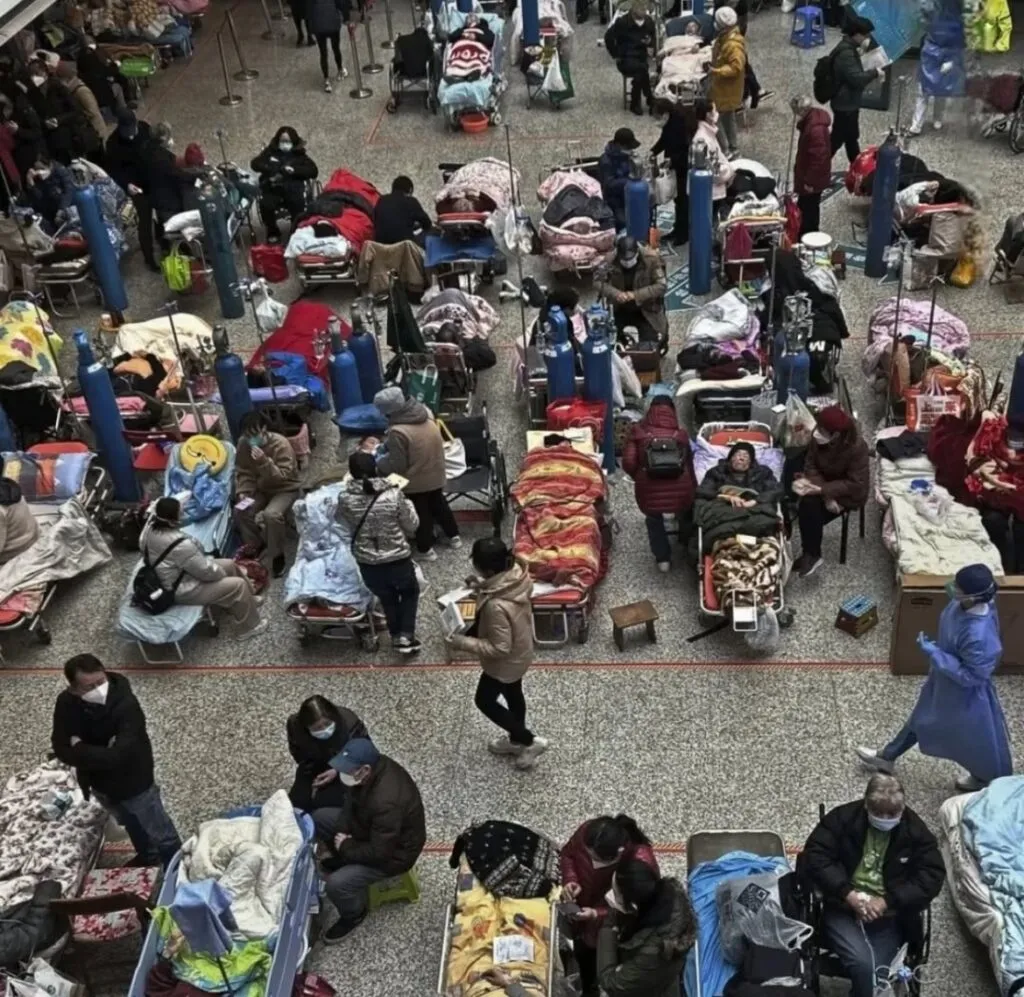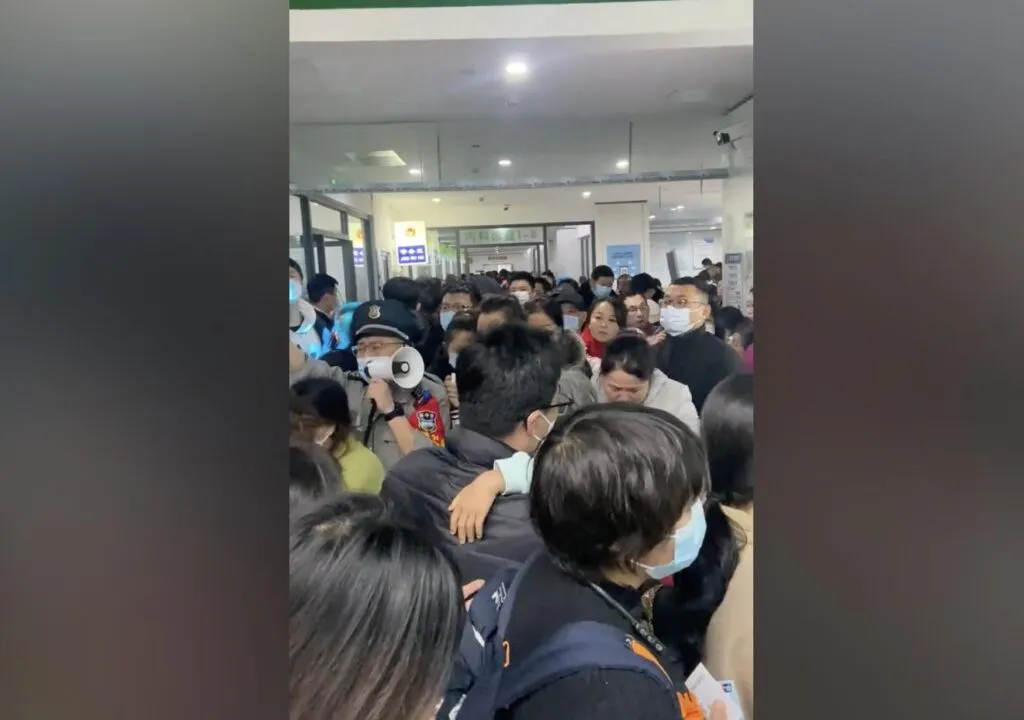Another Virus Outbreak in China, Cases of HMPV Virus increasing Rapidly

| ➡️ Get instant news updates on Whatsapp. Click here to join our Whatsapp Group. |
After the coronavirus pandemic, a new virus has been spreading rapidly in China. China is experiencing a surge in infections of a respiratory virus, leading to overcrowded hospitals, emergency measures, and public concerns about an outbreak. The virus, identified as human metapneumovirus (HMPV), has seen cases increasing across northern Chinese provinces this winter, particularly among children. The videos of this virus outbreak are going viral on social media.


⚠️ BREAKING:
China 🇨🇳 Declares State of Emergency as Epidemic Overwhelms Hospitals and Crematoriums.
Multiple viruses, including Influenza A, HMPV, Mycoplasma pneumoniae, and COVID-19, are spreading rapidly across China. pic.twitter.com/GRV3XYgrYX— SARS‑CoV‑2 (COVID-19) (@COVID19_disease) January 1, 2025
चीन ने HMPV और कोविड-19 के व्यापक प्रकोप के कारण आपातकाल की घोषणा की।#China #Virus #Covid19 pic.twitter.com/fUDzk8ctYl
— Kalyani Ambedkar 🇮🇳 (@KalyaniAmbedkar) January 3, 2025
As per the reports, schools have been closed in China as children are getting attacked by virus easily. The outbreak comes five years after the emergence of a novel coronavirus in Wuhan, China, which later turned into a global pandemic. Millions of people lost their lives due to the coronavirus pandemic. Now, this new virus HMPV has created fear among the people as there is no vaccination still available for this virus.
Photos and videos of people wearing masks in hospitals in China emerged on social media platforms and local reports said the scenes of an outbreak of HMPV were similar to the initial Covid outbreak. Health authorities are implementing emergency measures to monitor and manage the spread. The hospitals in China are getting overcrowded due to increasing number of patients. Let’s understand what this HMPV virus is.
What is Human metapneumovirus or HMPV?
Human metapneumovirus, or HMPV, is a respiratory virus that causes symptoms similar to the common cold and influenza. While the illness is typically mild, it can lead to severe complications such as pneumonia, particularly in infants, the elderly, and those with weakened immune systems.

The virus is not new but has gained attention amid a surge in cases, particularly in children under 14 in northern China. First identified in 2001, HMPV is a single-stranded RNA virus that spreads through respiratory droplets or contact with contaminated surfaces. The infections have been previously identified in various countries, including the United Kingdom.
Its symptoms include cough, fever, nasal congestion, and fatigue, with an incubation period of three to six days. Unlike Covid-19, there is no vaccine or specific antiviral treatment for HMPV; treatment primarily involves managing symptoms.
How to stay safe from HMPV Virus?
While there is currently no specific treatment or vaccine for hMPV, you can take precautions to stay safe and reduce the risk of infection. Here are some tips to protect yourself and others:
1. Practice Good Hygiene
- Wash Your Hands Frequently: Use soap and water for at least 20 seconds, especially after coughing, sneezing, or touching surfaces in public places.
- Use Hand Sanitizer: If soap and water are not available, use an alcohol-based hand sanitizer with at least 60% alcohol.
2. Avoid Close Contact with Sick Individuals
- Stay away from people showing symptoms of respiratory illness, such as coughing, sneezing, or fever.
- Avoid sharing personal items like utensils, towels, or cups with infected individuals.
3. Wear a Mask in Crowded Places
- Consider wearing a well-fitting mask in crowded or poorly ventilated areas, especially during flu and respiratory virus seasons.
4. Disinfect Surfaces
- Regularly clean and disinfect frequently touched surfaces like doorknobs, light switches, mobile phones, and keyboards.
5. Avoid Touching Your Face
- Avoid touching your eyes, nose, and mouth with unwashed hands, as this is a common way viruses enter the body.
6. Boost Your Immune System
- Eat a Balanced Diet: Include fruits, vegetables, whole grains, and lean proteins to strengthen your immune system.
- Stay Hydrated: Drink plenty of water throughout the day.
- Get Adequate Sleep: Aim for 7–8 hours of sleep per night to help your body fight off infections.
7. Stay Home if You’re Sick
- If you have symptoms such as fever, cough, or difficulty breathing, stay home to prevent spreading the virus to others.
8. Get Regular Health Check-Ups
- Regular check-ups can help you detect and manage any underlying health conditions that might increase your risk of severe illness.
9. Educate Children About Hygiene
- Teach children proper handwashing techniques and the importance of covering their mouth and nose when coughing or sneezing.
10. Seek Medical Advice if Needed
- If you develop severe symptoms such as difficulty breathing, persistent fever, or chest pain, seek immediate medical attention.
By taking these precautions, you can significantly reduce the risk of contracting or spreading hMPV and other respiratory viruses. Stay informed and prioritize your health and safety!
Chinese Center for Disease Control and Prevention Data
The Chinese Center for Disease Control and Prevention published data showing that respiratory infections had risen significantly in the week of December 16 to 22, 2024; human metapneumovirus was linked to 6.2 percent of positive respiratory illness tests and 5.4 percent of respiratory-illness hospitalizations in China, more than COVID-19, rhinovirus or adenovirus. Kan Biao, head of the China CDC’s National Institute for Communicable Disease Control and Prevention, announced that the rate of HMPV among children ages 14 and under was on the rise in China.
What India said about HMPV Virus?
The Government of India is closely monitoring the situation in China. The Union Health Ministry said on Friday that it was closely monitoring the alleged outbreak of Human Metapneumovirus (HMPV) in China. The Ministry maintained that while China had reported a rise in respiratory illness, particularly HMPV, India hadn’t registered any unusual spike in winter respiratory diseases.